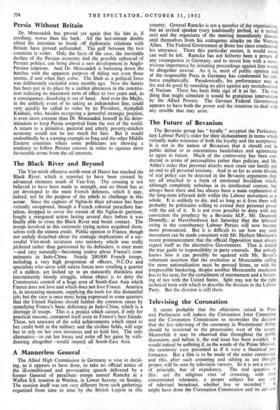The Future of. Bevanism
The Bevanite group has " loyally " accepted the Parliamen- tary Labour Party's order for their disbandment in terms which virtually make nonsense of both the loyalty and the acceptance. It is not in the nature of Bevanism that it should end in public defeat or in ostentatious handshakes and agreements to agree in future. Much of the controversy has been con- ducted in terms of personalities rather than policies, and Mr. Attlee's order-that personal attacks must cease can hardly put an end to all personal tensions. And in so far as some threads of real policy can be detected in the Bevanite arguments they are all attached to a form of emotional Socialism which, although completely nebulous in its intellectual content, has always been there and has always been a main explanation of the long-term leftward drift within the Labour movement as a whole. It is unlikely to die, and so long as it lives there will probably be politicians willing to extend their personal power with the aid of it. It is not even possible to deny with any conviction the prophecy by a Bevanite M.P., Mr. Desmond Donnelly; at Haverfordwest last Saturday- that the leftward swing in the constituency -Labour Parties will now become more pronounced. But it is difficult to see how any such movement can be made consistent with Mr. Herbert Morrison's recent pronouncenient that the official Opposition must always regard itself as the alternative Government. That is indeed the true guide to responsibility in party counsels. But nobody knows how it can possibly be squared with Mr. Bevan's vehement assertion that the resolution at Morecambe calling for more nationalisation must be pressed home, or with his irrepressible hankering, despite another Morecambe resolution less to his taste, for the curtailment of rearmament and a loosen- ing of ties with the United States. Split may not be the right technical term with which to describe the division in the Labour Party. But the division is still there.


































 Previous page
Previous page